英语成语的理解与翻译
中英直译难以理解的成语

中英直译难以理解的成语
中英直译难以理解的成语有很多,以下是一些例子:
“打落水狗”(beat a drowning dog):直译为“打落水狗”,意思是继续攻击已经失败的对手,使其无法翻身。
这个成语在英语中可能难以理解,因为英语中没有类似的表达方式。
“杀鸡给猴看”(kill the cock to warn the monkey):直译为“杀鸡给猴看”,意思是惩罚一个人以警告其他人。
这个成语在英语中可能难以理解,因为英语中没有类似的表达方式。
“食肉寝皮”(eat the flesh of the enemy and sleep on his skin):直译为“食肉寝皮”,意思是极度仇恨敌人,甚至想食其肉、寝其皮。
这个成语在英语中可能难以理解,因为英语中没有类似的表达方式。
“千刀万剐”(thousand cuts and myriad pieces):直译为“千刀万剐”,意思是遭受极端的痛苦或折磨。
这个成语在英语中可能难以理解,因为英语中没有类似的表达方式。
总之,由于中英两种语言的差异和文化背景的不同,很多中文成语在英语中没有对应的表达方式,因此直译可能会造成理解上的困难。
在进行翻译时,需要考虑到目标语言的文化背景和表达习惯,采用适当的翻译方法和技巧,以确保译文准确、流畅、易于理解。
成语中英文对照

一不做,二不休in for a penny, in for a poundHe was found stealing money from his landlady by her daughter. "In for a penny, in for a pound," he muttered to himself and then killed the little girl.一文不名;一贫如洗not have (or without) a penny to one's name; not have two halfpennies to rub together; (as) poor as a church mouse; not have a bean; not have (or without) a red centWhen I got married I didn't have a penny to my name.That family never seem to have two halfpennies to rub together.I am sorry, I can't lend you anything -- I haven't got a red cent.一石二鸟;一箭双雕;一举两得kill two birds with one stoneSince Benjamin, one of my classmates in university, lives near my mother, I'll call in on him as well and kill two birds with one stone.一帆风顺plain sailingThe security situation in the Taiwan Strait is far from being plain sailing.一见如故get on like a house on fire (英) / get along like a house on fire (美)If two people get on/along like a house on fire, they like each other very much and becomefriends very quickly.I was worried that they wouldn't like each other, but in fact they're getting on/along like a house on fire.一文不值not worth a damnHis promise isn't worth a damn.一针见血;一语中的hit the nail on the headHe hit he nail on the head when he mentioned casual sex as being the cause of her coming down with AIDS.一言以蔽之in a nutshellThere's a lot I could say about my boss's speech but to put it in a nutshell, it was terrible.一命呜呼turn up one's toesI hope to take a trip to the United States before I turn up my toes.一丝不苟dot one's/the i's and cross one's/the t'sYou'd better make sure you dot your i's and cross your t's if you want to work at that company. They're very keen on details.一丝不挂in a state of nature; in the altogether; in the buff; not have a stitch on (or without a stitch on) I had just got out of the bath and still was in the buff (or in the altogether/in a state of nature) when the maid walked in without knocking.I had just got out of the bath when he knocked at the door and I didn't have a stitch on.一模一样as like as two peas (in a pod)If two brothers or two sisters are very much alike, you can say they are as like as two peas in a pod.一鸣惊人;一举成名;不同凡响set the Thames on fire (英) / set the world on fire (美)Mary may set the Thames on fire with her piano playing.His great invention set the world on fire.一筹莫展up the creek (without a paddle)He was really up the creek when his wife left him.一丘之貉;物以类聚birds of a feather (flock together); be tarred with the same brushWe all thought that he and his girlfriend were birds of a feather.I dislike politicians of all parties because they're all tarred with the same brush.一箭之遥;近在咫尺a stone's throwMy house is only a stone's throw from the school.一意孤行;我行我素;独断独行go/take one's own wayI warned him not to marry that girl, but he was determined to go his own way.一知半解a little knowledgeA little knowledge is a dangerous thing. (这一句是颇有名的谚语,意为「一知半解最危险;半瓶子醋害死人」)一见钟情fall in love (with someone) at first sight; love at first sight(这里"love" 为名词)They fell in love with each other at first sight.They fell in love at once; it was love at first sight.一清二楚(as) clear as crystal; (as) clear as a bellI don't know why you can't understand the instructions; they're as clear as crystal to me. The whole thing was as clear as a bell to me. I knew what to do.一窍不通be all Greek to someoneHe tried to explain how the computer worked, but it was all Greek to me.一白遮三丑A white complexion is powerful enough to hide seven faults.A white complexion is powerful enough to hide seven faults.一朝被蛇咬,十年怕草绳;上一次当,学一次乖once bitten, twice shyHe has cheated and deceived me on one occasion, so I don't trust him. Once bitten, twice shy.九牛一毛;沧海一粟;杯水车薪a drop in the ocean/bucketThe money we collected for the victims of the Indian Ocean tsunami disaster is really just a drop in the ocean.入不敷出live beyond one's meansMy father always told me not to live beyond my means.入乡随俗when in Rome, do as the Romans doA lot of people often say "when in Rome, do as the Romans do."十之八九nine times out of tenWhen my wife comes home from work, nine times out of ten she buys me an evening newspaper.十拿九稳;稳操胜券be in the bagWe're sure to win. The match is in the bag.力不从心;心余力绌;心有余而力不足the spirit is willing, but the flesh is weak (这两句的上半句"the spirit is willing" 和下半句"the flesh is weak" 常被分开单独使用)When I asked him for help yesterday, he said "my spirit is willing, but my flesh is weak." 人面兽心;口蜜腹剑;笑里藏刀(披着羊皮的狼)a wolf in sheep's clothingMary trusted Jack until one day she was cheated by him, and realized thathe was a wolf in sheep's clothing.人不可貌相appearances are often deceptive"Appearances are often deceptive" is a commonly used idiom, meaning things are not always what they seem to be.三心两意in two mindsMy wife thinks we should go to South Korea for our holiday, but I'm still in two minds about it.三番两次again and again; over and over (again); time and (time) again; time after timeI've told my son again and again not to run a red light. (to run a red light:闯红灯)三缄其口hold one's peace/tongueIn spite of the fact that he made provocative remarks, I held my peace/tongue.三思而后行look before you leapLook before you leap when doing business on the Web.三句不离本行;说行话;谈论工作上的事情(这成语通常带有贬义,暗示这些关于工作的言谈让人觉得很无聊)(to) talk shopThey did nothing but talked shop, and I came home early because it was so boring.三个臭皮匠顶个诸葛亮two heads are better than oneTwo heads are better than one.大同小异;半斤八两(very) much of a muchnessThe two articles are very much of a muchness.大相径庭poles apartThey are poles apart in their political attitudes.千方百计by hook or by crook; leave no stone unturned (or no stone be left unturned)I know this work looks difficult, but I'll finish it by hook or by crook.The police left no stone unturned to catch Taiwan's most wanted fugitive Chang Hsi-ming (张锡铭) and they succeeded.He promised no stone would be left unturned to get his wife back.千载难逢once in a blue moonMy wife and I rarely, if ever, eat out. So, when I told her last night "let's eat out and go to see a movie", she was very surprised and said that's really once in a blue moon.寸步不离at one's elbowHis wife was always at his elbow whenever an important decision had to be taken.大海捞针(like) looking/searching for a needle in a haystackTrying to find a book we want in so many books is just like looking for a needle in a haystack.口是心非;言不由衷with one's tongue in one's cheek (adv.); tongue in cheek (adv.); tongue-in-check (adj.) He described me as an excellent teacher, but he said it tongue in cheek/with his tongue inhis cheek.That's a tongue-in-cheek remark/reply.大惊小怪;小题大作make a mountain out of a molehillDon't make a mountain out of a molehill when you know I look about ten years younger than I really am. (I look about ten years younger than I really am. 我看起来比实际年龄年轻大约10岁)小题大作;杀鸡用牛刀break a butterfly on a/the wheel (「小题大作」亦可用"make a meal out of" 和"make a mountain out of a molehill" 来表示)I know what I've done is wrong, but there's no need to break a butterfly on a wheel/to make a meal out of it.大发雷霆do one's nutWhen I told him what she had said about him, he did his nut.大获全胜;所向披靡sweep the board; carry (or sweep)all/everything before oneI swept the board at the casino last night.Although I hadn't done well at high school, I carried all before me at university.亡羊补牢lock the stable door after the horse has boltedIt is never too late to lock the stable door after the horse has bolted.小洞不补,大洞吃苦a stitch in time saves nine (经常略为"a stitch in time")You should try and repair your car before it becomes worse. Remember, a stitch in time saves nine.井井有条;井然有序in apple-pie orderMy wife likes to keep everything in apple-pie order.少年老成;老成持重have an old head on young shouldersMichael has an old head on young shoulders and handles his business very well.手足无措not know where to put oneself/one's faceWhen I told Linda almost everyone at her department had seen the photo of her hugging and kissing her boyfriend affectionately in the street, she was so embarrassed she didn'tknow where to put herself/her face.日复一日(或一连数天)day after day; day in day out (这亦可写成"day in, day out")It went on raining day after day.If we do the same things day in day out, it isn't surprising we get bored.附注:关于"day after day",其他表示时间的词也可以这样用,如"year after year","month after month" 和"night after night";至于"day in day out",其他表示时间的词,尤其是表示较长时间的词,也可以这样用,如"year in year out" (这亦可写成"year in, year out",以下亦同),"month in month out","week in week out" 和"night in night out",但hours, minutes 和seconds 则不可以这样用。
四字成语的英文翻译方法

四字成语的英文翻译方法1. 英语的四字成语优质解答keep somebody at arm's length,形影不离be on one's back,卧病在床make somebody's blood boil,热血沸腾Keep one's shirt on,忍辱负重Shout something from the rooftops ,登高而呼 Be all ears,洗耳恭听 out of the blue,猝不及防 at sixes and sevens,乱七八糟 A bolt from the blue 晴天霹雳love you love your dog 爱屋及乌 a bad apple,金玉其外,败絮其中It rains dogs and cats.倾盆大雨 Fish in trouble water.混水摸鱼Teach fish to swim.班门弄斧 Beat the dog before the lion.杀鸡敬猴。
2. 英语四字成语大全饱经风霜bǎo jīng fēng shuāng【解释】饱:充分;经:经历;风霜:比喻艰难困苦。
形容经历过长期的艰难困苦的生活和斗争。
【出处】清·孔尚任《桃花扇》第二十一出:“鸡皮瘦损,看饱经雪霜,丝鬓如银。
”【结构】动宾式。
【用法】用于经验极其丰富;有时也可用拟人化手法指物。
一般作谓语、定语。
【正音】经;不能读作“jīn”。
【辨形】经;不能写作“径”。
【近义词】饱经世故、曾经沧海【反义词】一帆风顺、养尊处优【辨析】~和“饱经沧桑”;都含有“阅历深”的意思。
但“饱经沧桑”偏重强调经历许多变化的意思;“~”偏重强调经历过长期艰难困苦生活的磨练的意思。
【例句】(1)这位~的老人深深地热恋着自己的祖国。
(2)王大爷在旧社会~;十分热爱新社会的幸福生活。
【英译】endure all the hardships of exposure。
10个英文成语详解
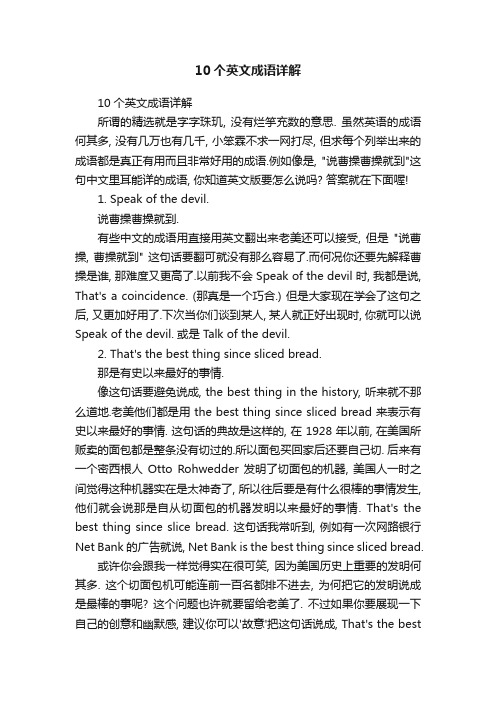
10个英文成语详解10个英文成语详解所谓的精选就是字字珠玑, 没有烂竽充数的意思. 虽然英语的成语何其多, 没有几万也有几千, 小笨霖不求一网打尽, 但求每个列举出来的成语都是真正有用而且非常好用的成语.例如像是, "说曹操曹操就到"这句中文里耳能详的成语, 你知道英文版要怎么说吗? 答案就在下面喔!1. Speak of the devil.说曹操曹操就到.有些中文的成语用直接用英文翻出来老美还可以接受, 但是"说曹操, 曹操就到" 这句话要翻可就没有那么容易了.而何况你还要先解释曹操是谁, 那难度又更高了.以前我不会 Speak of the devil 时, 我都是说, That's a coincidence. (那真是一个巧合.) 但是大家现在学会了这句之后, 又更加好用了.下次当你们谈到某人, 某人就正好出现时, 你就可以说Speak of the devil. 或是 Talk of the devil.2. That's the best thing since sliced bread.那是有史以来最好的事情.像这句话要避免说成, the best thing in the history, 听来就不那么道地.老美他们都是用 the best thing since sliced bread 来表示有史以来最好的事情. 这句话的典故是这样的, 在 1928 年以前, 在美国所贩卖的面包都是整条没有切过的.所以面包买回家后还要自己切. 后来有一个密西根人Otto Rohwedder 发明了切面包的机器, 美国人一时之间觉得这种机器实在是太神奇了, 所以往后要是有什么很棒的事情发生, 他们就会说那是自从切面包的机器发明以来最好的事情. That's the best thing since slice bread. 这句话我常听到, 例如有一次网路银行Net Bank 的广告就说, Net Bank is the best thing since sliced bread.或许你会跟我一样觉得实在很可笑, 因为美国历史上重要的发明何其多. 这个切面包机可能连前一百名都排不进去, 为何把它的发明说成是最棒的事呢? 这个问题也许就要留给老美了. 不过如果你要展现一下自己的创意和幽默感, 建议你可以'故意'把这句话说成, That's the bestthing since the invention of space shuttle. (自从太空梭发明以来最棒的事.)3. When in Rome, do as the Romans do.When you are at Rome, do as they do at Rome.入境随俗.在美国有一群特殊的美国人, 他们坚持用传统的方式生活, 自己耕种, 驾马车, 不用电, 不能拍照. 这群人就是 Amish. 也因为这样, 很多他们居住的地方现在却成了观光胜地.听来很讽刺, 不是吗? 话说上次我去某个个 Amish 的市集买东西时, 看到很多的 Amish. 我好奇之下就问其中一个作 Amish 打扮的人说, Are you Amish? 结果你猜他怎么说? 他说, When in Rome, do as the Romans do. 天啊! 原来是个冒牌货! 所以大家下次不要再被骗了.从字面上的意思来看, When in Rome, do as the Romans do. 就是说当你在罗马的时候, 要表现的跟罗马人一样, 所以就有入境随俗的意思在内.另外关于罗马还有一些很常听到的成语可以顺便记一下, Rome was not built in a day. (罗马不是一天造成的.) All roads lead to Rome. (条条大路通罗马.)4. The lesser of the two evils.二颗烂苹果中比较不烂的.记得我刚来美国时我都会把这句话照中文的字面意义下去直接翻译, 说成, The better one of two rotten apples. 当然老美也是听得懂.直到有一次我班上的同学纠正我说, 这句话应该是The lesser of the two evils. 意谓著二恶相权取其轻. 说得再口语一点, 就是二颗烂苹果中比较不烂的意思吧!5. This is like chickens and eggs.这就像是倒底是先有鸡还是先有蛋的的道理.记得我在小学的时候我就会问, 鸡生蛋, 蛋生鸡, 那到底是先有鸡还是先有蛋.这个问题到我现在念到博士班了还是不会.所以看来这二十年是不是有点浪费了? 回到主题, 任何不知道时间先后的事情我们都可以用 chicken and eggs 来形容. 例如, 到底是有钱才去从政还是从政之后才有钱? This is like chickens and eggs.6. Beauty is in the eyes of the beholder.情人眼里出西施.这句话大家都不陌生吧! 要是看到某个美男和某个丑女走在一起, 你就可以深表婉惜地说, "Beauty is in the eyes of the beholder." 总之这是各人喜好, 我们也不便多说什么. 另外有一句成语, 一朵鲜花插在牛粪上, 我曾试著用 A flower in the bullshit 来诠释, 可惜似乎老美不太懂我在说些什么. 各位有什么更好的建议吗? 至于速配的'话, 可以试试, Every Jack has its Jill. (破锅自有烂盖配.) 或是 Let beggars match with beggars. (乞丐配乞丐)7. Practice makes perfect.熟能生巧.不但是音乐家也好, 运动员也好, 在他们的成长过程中, 总是需要不断的练习才能有完美的演出. 这就造就了一句成语, Practice makes perfect. 鼓励别人要不断地去尝试错误.类似的成语例如 When at first you don't succeed, try try again. (如果一开始不成功的话, 要不断地尝试下次, 注意这里的 try try again 不是我多打了一个 try 而是老美真的是这样说的.),8. There is no such a thing as free lunch.天下没有白吃的午餐.这句成语太出名了, 似乎没有人不知道.这也是经济学的理论基础吧! 天底下没有那么好的事情可以不劳而获. 总之, 当我们听到一件事情好到不可思议时, 例如一元手机, 免费上网, 我们就可以对别人说, There is no such a thing as free lunch.但是有规则就有例外, 个人觉得美国的教会或是救世军(Salvation Army) 之类的慈善组织就蛮喜欢请大家吃免费的午餐.例如他们有时会办一些免费的 BBQ, 随到随吃, 吃到饱为止, 完全打破了天下没有白吃的午餐这个规则.9. If you can't dazzle them with your brilliance, baffle them with your bullshit.如果你无法用你的才能无法说服别人, 就用你的废话迷惑别人吧!这也许是个不争的事实, 老美在数理的基础上也许不如我们东方人, 但他们在数据收集, 上台报告方面却硬是比我们强上一大截, 这或许也是外国人无法在美国站上主流社会的原因之一吧! 所以各位要记得, baffle others with your bullshit. 把三分的结果加上七分的 bullshit. 就能拿到一个十分的成绩. 或许很讽刺, 但现实生活不也是如此吗?还有一些类似摆烂的成语, 蛮有趣的, 例如, If everything else fails, manipulate the data. (如果所有的方法都失败了, 就试著去改变量据吧!) 或是 If at first you don't succeed, destroy all evidence that suggests you tried. (如果你不成功, 就把建议你这么作的所有证据都给毁了.)10. God is shining on you.你真是幸运.God is shining on you 就是指一个人非常幸运, 也就等于 You are very lucky 的意思. 例如大家修理一台机器都修不好, 结果你一来一下子就把问题给找出来, 别人就会对你说 God is shining on you.。
英语成语及解释
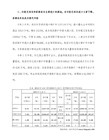
Blow your own horn
自吹自擂
No one is indispensable./Everyone is dispensable
没有什么人是不可取代的
Don't sotp not talking.
Be the change you want to see in the world —— Gandni
鱼和熊掌不能兼得。
He has a chip on his shoulder. chip=bitter
苦闷的人
Where there is a will, there is away.
有志者事竟成。
No news is good news.
没有消息就是好消息。
The more the merrier
Better the devil you know than the devil you don't.
你目前的老板和工作环境虽然不好,但新的老板和新的环境,说不定更糟。
Better to have been an old "has been" than a "never was"
宁作过时的名人,不作默默无闻的人。
欲变世界,先变其身
Neck ro neck
齐头并进
The apple never falls far from the tree.
有其父,必有其子。
Байду номын сангаас
Noting comes from noting./No pain,no gain.
一份耕耘,一份收获/不劳而无获
You can't have your cake and eat it.
英语成语及解释
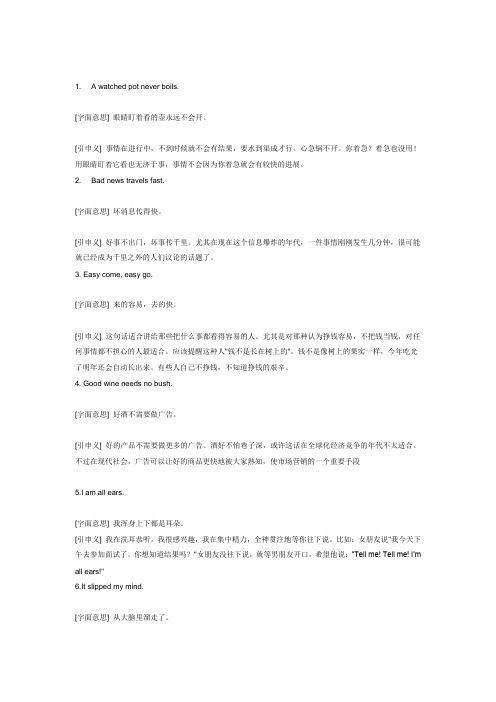
1. A watched pot never boils.[字面意思] 眼睛盯着看的壶永远不会开。
[引申义] 事情在进行中,不到时候就不会有结果,要水到渠成才行。
心急锅不开。
你着急?着急也没用!用眼睛盯着它看也无济于事,事情不会因为你着急就会有较快的进展。
2. Bad news travels fast.[字面意思] 坏消息传得快。
[引申义] 好事不出门,坏事传千里。
尤其在现在这个信息爆炸的年代,一件事情刚刚发生几分钟,很可能就已经成为千里之外的人们议论的话题了。
3. Easy come, easy go.[字面意思] 来的容易,去的快。
[引申义] 这句话适合讲给那些把什么事都看得容易的人。
尤其是对那种认为挣钱容易,不把钱当钱,对任何事情都不担心的人最适合。
应该提醒这种人"钱不是长在树上的"。
钱不是像树上的果实一样,今年吃光了明年还会自动长出来。
有些人自己不挣钱,不知道挣钱的艰辛。
4. Good wine needs no bush.[字面意思] 好酒不需要做广告。
[引申义] 好的产品不需要做更多的广告。
酒好不怕巷子深,或许这话在全球化经济竞争的年代不太适合。
不过在现代社会,广告可以让好的商品更快地被大家熟知,使市场营销的一个重要手段5.I am all ears.[字面意思] 我浑身上下都是耳朵。
[引申义] 我在洗耳恭听。
我很感兴趣,我在集中精力,全神贯注地等你往下说。
比如:女朋友说"我今天下午去参加面试了。
你想知道结果吗?"女朋友没往下说,就等男朋友开口,希望他说:"Tell me! Tell me! I’m all ears!"6.It slipped my mind.[字面意思] 从大脑里溜走了。
[引申义] 忘记了,没记住。
打击最熟悉的I forget it.和I can’t remember it. 都是说我忘记了,但是这个表达式口语里的常用成语,是不是更形象?举个例子:I meant to tell you your girl friend had called, but it slipped my mind.意思就是:我本想告诉你,你的女朋友来电话了,但是我把这事给忘记了。
英语成语深层解释
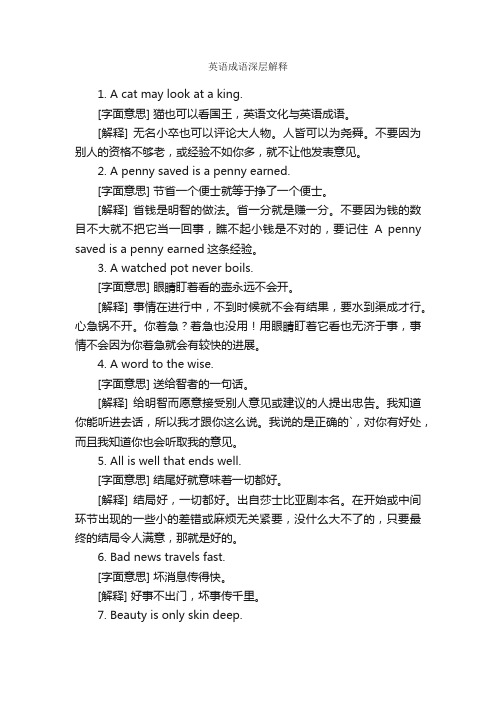
英语成语深层解释1. A cat may look at a king.[字面意思] 猫也可以看国王,英语文化与英语成语。
[解释] 无名小卒也可以评论大人物。
人皆可以为尧舜。
不要因为别人的资格不够老,或经验不如你多,就不让他发表意见。
2. A penny saved is a penny earned.[字面意思] 节省一个便士就等于挣了一个便士。
[解释] 省钱是明智的做法。
省一分就是赚一分。
不要因为钱的数目不大就不把它当一回事,瞧不起小钱是不对的,要记住A penny saved is a penny earned这条经验。
3. A watched pot never boils.[字面意思] 眼睛盯着看的壶永远不会开。
[解释] 事情在进行中,不到时候就不会有结果,要水到渠成才行。
心急锅不开。
你着急?着急也没用!用眼睛盯着它看也无济于事,事情不会因为你着急就会有较快的进展。
4. A word to the wise.[字面意思] 送给智者的一句话。
[解释] 给明智而愿意接受别人意见或建议的人提出忠告。
我知道你能听进去话,所以我才跟你这么说。
我说的是正确的`,对你有好处,而且我知道你也会听取我的意见。
5. All is well that ends well.[字面意思] 结尾好就意味着一切都好。
[解释] 结局好,一切都好。
出自莎士比亚剧本名。
在开始或中间环节出现的一些小的差错或麻烦无关紧要,没什么大不了的,只要最终的结局令人满意,那就是好的。
6. Bad news travels fast.[字面意思] 坏消息传得快。
[解释] 好事不出门,坏事传千里。
7. Beauty is only skin deep.[字面意思] 美貌只是肤浅的。
[解释] 美貌只是表面现象而已。
以貌取人靠不住。
你不能只看到她有漂亮的面孔就向她求爱,你还应该考虑其它方面的因素。
找结婚伴侣是要过日子,不是当海报招贴画来看的,习语俗语《英语文化与英语成语》。
成语的英文翻译
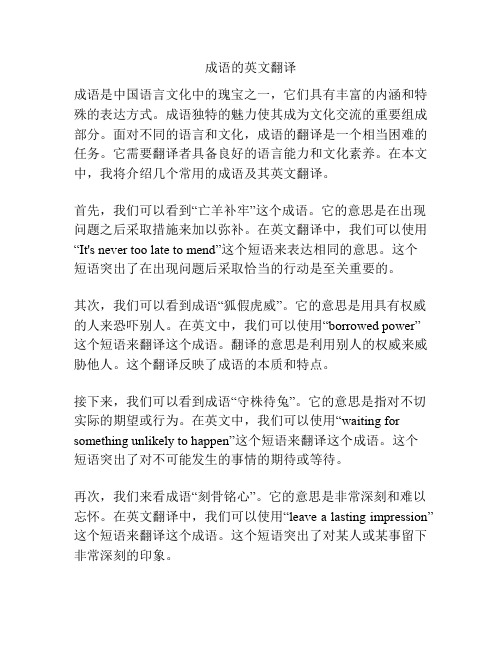
成语的英文翻译成语是中国语言文化中的瑰宝之一,它们具有丰富的内涵和特殊的表达方式。
成语独特的魅力使其成为文化交流的重要组成部分。
面对不同的语言和文化,成语的翻译是一个相当困难的任务。
它需要翻译者具备良好的语言能力和文化素养。
在本文中,我将介绍几个常用的成语及其英文翻译。
首先,我们可以看到“亡羊补牢”这个成语。
它的意思是在出现问题之后采取措施来加以弥补。
在英文翻译中,我们可以使用“It's never too late to mend”这个短语来表达相同的意思。
这个短语突出了在出现问题后采取恰当的行动是至关重要的。
其次,我们可以看到成语“狐假虎威”。
它的意思是用具有权威的人来恐吓别人。
在英文中,我们可以使用“borrowed power”这个短语来翻译这个成语。
翻译的意思是利用别人的权威来威胁他人。
这个翻译反映了成语的本质和特点。
接下来,我们可以看到成语“守株待兔”。
它的意思是指对不切实际的期望或行为。
在英文中,我们可以使用“waiting for something unlikely to happen”这个短语来翻译这个成语。
这个短语突出了对不可能发生的事情的期待或等待。
再次,我们来看成语“刻骨铭心”。
它的意思是非常深刻和难以忘怀。
在英文翻译中,我们可以使用“leave a lasting impression”这个短语来翻译这个成语。
这个短语突出了对某人或某事留下非常深刻的印象。
最后,我们可以看到成语“视而不见”。
它的意思是故意忽视或忽略某个问题。
在英文中,我们可以使用“turn a blind eye to”这个短语来翻译这个成语。
这个翻译反映了对某个问题的故意忽视或忽略。
以上是几个常用的成语及其英文翻译。
成语代表了中国文化传统的一部分,因此在翻译时需要注意保持其独特的韵味和内涵。
翻译成语需要翻译者具备优秀的语言能力和文化素养,以便准确传达成语的意义和特点。
通过正确和恰当地翻译成语,我们可以更好地传播和推广中国的语言和文化。
- 1、下载文档前请自行甄别文档内容的完整性,平台不提供额外的编辑、内容补充、找答案等附加服务。
- 2、"仅部分预览"的文档,不可在线预览部分如存在完整性等问题,可反馈申请退款(可完整预览的文档不适用该条件!)。
- 3、如文档侵犯您的权益,请联系客服反馈,我们会尽快为您处理(人工客服工作时间:9:00-18:30)。
中文摘要:成语是在语言使用过程中形成一种独特的、约定俗成的、具有完整独特意义的语言。
其语义并非等同组成成分意义的简单相加,人们很难从个别词义猜出整个成语的含义。
那么,如何理解以及如何翻译成语就成为外语学习者面临的一个语言难点,也是外语学习者必须要解决的一个问题。
本文拟就英语成语的来源,以及理解与翻译问题做些初步探讨。
关键字:英语成语;成语来源;翻译Abstract:Idiom is a language, which forms a kind of particular, accepted through common practice and has its completely meaning in the process of language using. Its meaning is not an easy addition of single word’s m eaning, so it is difficult for people to guess the meaning of an English idiom. Therefore, how to understand and translate idiom becomes difficult to foreign language learners. But, foreign language learners must face it and deal with it. This paper is about the source of English idiom, and the translation of English idiom.Key words: English idiom;Source of English idioms ;Translation一.什么是成语(idiom)成语是词组,其含义不同于其中单词的含义,(idiom is phrase which means something different from meanings of the separate words)是不能明显地从构成其成分的单词的含义中找到其含义的词组和句子,必须从整体上进行理解。
(phrase or sentence whose meaning not obvious through knowledge of the individual meanings of the consituent words but must be learnt as a whole)[1][P121]根据以上对成语的定义,不难看出成语具备以下三大特征:1)意义上的整体性。
如:To lay heads together. “大家一起思考,集思广益”。
不是“把头放在一起”。
2)不符合语法规律。
如:Money makes the more to go.“有钱能使鬼推磨。
”其中make 后面的不定式go前加上了to。
3)用词相对固定。
A stitch in time saves nine .“及时的一针省几针。
”其中的A不能用one 代替。
二.成语的来源翻译成语之前,首先要求对它有确切的理解,弄清成语背后所蕴含的丰富文化知识和实际含义。
只有在真正了解了成语的确切含义后,才能作出恰如其分的翻译。
但若对成语的语源意义缺乏了解亦会构成理解上的障碍,进而对翻译造成困难。
因此了解成语的来源出处对成语的理解与翻译是很有必要。
1. 源自神话传说英语中的成语主要源自古希腊,古罗马等的传说。
如:Achilles’ heel 就出自希腊神话,阿季里斯是密耳弥多涅斯人的国王,玻琉斯和爱琴海神涅柔斯女儿西蒂斯的儿子。
他的母亲西蒂斯预见到他会夭折。
在他出世后,白天用天宫琼浆擦他的身体,夜间把他投入火里锻炼,想烧掉他身上的凡胎浊骨,并且还捏着他的脚后跟,倒浸在冥河水里,这样周身即可刀枪不入。
后来,特洛伊战争中他恰恰是脚后跟中箭而阵亡。
因为他母亲用手捏住了他的脚后跟,以致脚后跟未沾过冥河的水,这就成了他的致命的弱点[1][P122]。
今天,Achilles’ heel 已经演变成了成语,比喻“致命弱点”或“要害”。
Rain cats and dogs,源于北欧神话,据说猫对天气有很大的影响。
Swan song ,据传说,天鹅在临终前唱的歌最优美动人,后人就用Swan song来比喻诗人,作曲家的“最后的作品”[2][P125]。
2.源自文学名著很多成语源自文学名著中的历史典故。
《圣经》不仅是一部宗教经典,也是一部文学巨著,它在世界文学史上占有重要的地位。
例如,by the skin of ones teeth,语出圣经《旧约。
约伯记》第19章第20节。
上帝使约伯倾家荡产,疾病缠身,以考验他是否坚信上帝。
在这种情况下很多人都抛弃了他。
但他忍受着,他对朋友说:“我的皮肉紧贴骨头,我只剩牙皮逃脱了。
”牙本无皮,这是极言其险,除生命外全部丧失。
人们借用此成语,意指“九死一生”,“侥幸逃脱”[3][P30]。
One pound of flesh(割肉还债,残酷榨取)出自莎士比亚的喜剧剧作《微尼斯商人》中夏洛克要残忍地从欠债人安东尼奥的胸前割下一磅肉的故事情节。
3.源自历史事件历史上的著名历史事件被后人沿用而完成了成语。
例如,Sword of Damocles[4][P184], 出自古代希腊的一则历史故事。
公元前4世纪西西里岛上的统治者狄奥尼修斯一世有个佞臣叫达摩克里斯,他很羡慕帝王的豪华生活。
狄奥尼修斯为了教训这个人,要其赴宴,要他坐在国王的宝座上,在他头上用一根头发悬着一把剑,随时都有刺到头顶的危险。
他吓得战战兢兢,如坐针毡,时刻提心吊胆,惶惶不安。
这个成语后来就被用来比喻极端的危险或情况的危急。
又如,burn one’s boats[5][P38](破釜沉舟),源自古罗马朱力斯·凯撒大军乘船越过Rubicon后便把船烧了,以此向士兵表明后路已断,不可能后退。
后被用来比喻“下定决心干到底”。
4.源自风尚、习俗英语中有很多成语来自于风尚、习俗。
例如,英语有a feather in your cap(荣耀),源于印第安人的一种风俗,每杀死一个人就在头饰或帽子上加插一根羽毛,以此来显示战绩与荣誉。
还有如:give somebody the boot 解雇某人,开除某人above the sault 尊为贵宾,位于上席spill the beans 泄露秘密5.源自某些动物的特征英语中a bird of ill omen(不祥之兆),源自古代占卜的风俗。
渡鸟嗅觉灵敏,能判定远方腐尸位置。
因此渡鸟象征死亡。
再譬如狼因饥饿而残忍,因而衍生了很多成语:keep the wolf from the door 免于饥饿,勉强度日。
To have a wolf in the stomach 形容一个人极度饥饿。
又如:a cat has nine lives 猫有九命,富于生命力的人。
To drink like a fish 牛饮[2][P126]。
6.源自行业用语自有社会分工以来,人们所从事的职业有所不同,从而把各个行业有关的用语用于生活之中。
很多成语来自于不同的行业,特别是发展最早的农业和工业,包括手工业、商业等行业。
来自农业的成语:as a man sows, so he shall reap 种瓜得瓜,种豆得豆。
As cool as cucumber 泰然自若。
来自工业的成语:a square peg in a round hole 文不对体,不得其所。
To hit the right nail on the head 击中要害。
来自餐饮业的成语:out of the frying-pan into the fire 才出狼窝,又入虎口。
A little pot is easy hot 壶小易热,量小易怒。
7.源自生活用语人们善于从生活经验中总结出富有哲理性的成语,用来告诫和警示后人如:every cook praises his own broth 王婆卖瓜,自卖自夸as poor as the church mouse 一贫如洗[6][P81]三.成语翻译方法成语的功能和作用在于以其简洁和意象性来达到其修辞性效果。
很多成语都丧失了其本义而成为一种泛指的代称意义,而且不同民族的文化有其独特的历史文化和地域性特征。
在翻译实践中,很难保证成语的翻译一方面完全忠实于原文的比喻形式,另一方面又要符合民族语言文字的规范要求。
因此,在翻译时较为困难,需要分别对待采取多种方法处理。
1.直译法所谓直译法就是指对原成语的表现形式和意义原则上不做任何调整的一种翻译方法。
也就是按照文字的字面意思将成语直接翻译过来。
强调成语的民族、地域差异性,保持成语的风格和异域文化特色。
如:an eye for an eye and a tooth for a tooth 以眼还眼,以牙还牙[7][P68]。
Make hay while the sun shines 趁热打铁[5][P75]Run with the tail between the legs 夹着尾巴逃跑A wolf in sheep’s clothing披着羊皮的狼Blood is thicker than water 血浓于水这种直译法的译文能让中国读者理解,符合汉语习惯。
2.意译法意译法是指原文成语的形象不能翻译,而在目的语中找不到同义的对等成语时,只好将其照原文内容意思用自由词组或普通句子进行翻译。
如:Do you see any green in my eye? 你以为我是好欺骗的吗?People who live in glass houses should not throw stones. 如译成“住在玻璃房子里的人,不应扔石头”不如译成“已有过,勿正人”或“责人先责已”[8][P51]。
还有如:sour grapes 酸葡萄(效应);two heads are better than one 一个不及两人智;the right carpet 隆重的接待;cry over split milk 为不可挽回的损失而悲伤;cast the first stone 首先发起攻击;Go dutch 各自付费[9]。
3.同义成语借用法人类思维的共通性特征决定了不同文化背景的人们在语言的使用上也会有相同之处。
在两种语言中就会有些同义成语无论在内容、形式和色彩上都比较一致,它们不但有着相同的意思和隐义,而且有相同的或极相似的形象或比喻。
对于这一类型的成语自然可以使用意义对等,形式相似的成语进行翻译。
